(NCS reader, commenter, and frequent source of musical recommendations, HGD, has graciously stepped in to prepare this week’s SHADES OF BLACK column, as he has done before, given that our regular columnist (that would be me) is again unable to do so because of interference from the job that pays the bills around here.)
With Islander being swarmed with work over the last few weeks, I felt the need to step up and do my part to relieve his burden, if only a little. I’m pleased to present today’s Shades of Black column and hope all our regular and not so regular readers find something here that warms their blackened hearts. — HGD
WALLFAHRER
Wallfahrer are no strangers to NCS, having their debut Anthologie der Abkehr covered by this very column in May 2018. It was clear from that debut release that this German band, whose members choose anonymity, were onto something very special. So, when I found out that they had released a second album, Rattenritual, I immediately dropped what I was doing to check it out.
The band themselves offered no forewarning of the release and no commentary on it, save the following message: “The second proclamation. No explanations, no praising, no reviews here. We want you to create your own unswayed opinion of it.”
In keeping with Wallfahrer’s intent, I won’t delve into the album in detail. Suffice it to say that none of the melancholy or grandeur from the debut is missing here. It seems that the band have pored over every little detail and left nothing to chance. From the opening notes of “Wacht des Waldes (Im Antlitz der Hektoden)” to the closing notes of “Des Winters Joch (Still und müd’ wird die Welt)”, the album is rich in atmosphere and emotionality.
It’s also clear from reading the lyrics (in German) that Wallfahrer’s outlook on the world hasn’t changed much. Wallfahrer aren’t shy about speaking up about the ills of modern society: the greed, vanity and blind obedience that conspire to trample on the freedom of the individual. The music reflects this passionate condemnation of man’s shortsightedness while also paying homage to the liberating power of nature.
FACEBOOK:
https://www.facebook.com/Wallfahrer616/
BANDCAMP:
https://wallfahrer.bandcamp.com/album/rattenritual
FERRITERIUM
At this point in the year, it doesn’t seem controversial to say that French black metal of the melodic variety has had a banner year. Releases from Sühnopfer, Darkenhold, Griffon, Grylle, and Véhémence have provided ample evidence that the country’s unique, often medieval-inspired take on the genre is only moving from strength to strength. Now you can add one more name to that list in Ferriterium. Their new album Le Dernier Livre was released on May 6 by Epictural Production and is among the finest examples of France’s recent black metal renaissance.
The album itself is divided into six chapters (or Chapitres) which coalesce together to create a complete musical journey. There are similarities with the work of Karne (for whom Ferriterium’s mastermind Raido plies his trade) as well as Quebecois black metallers Délétère, but Ferriterium’s clever songwriting and feeling for melody ensures that they stand very much on their own.
There’s a palpable feeling of majesty in the way proceedings start: Chapitre 1 is very much a study in controlled aggression with session drummer Julien Helwin providing a manic counterpoint to the unearthly melodies conjured up by the guitars. It’s also the closest the band come to giving you a breather, as the tracks that follow immediately afterward offer little in the way of respite.
Chapitres 2 and 3 are a complete contrast to Ferriterium’s initial salvo: If the first track was intended to lull you into a false sense of security, the next two pull the rug out from under your feet. Chapitre 2 starts off serenely enough before launching into a frenzied blast-a-thon. Raido’s anguished howls accompany feverish melodies that grow more and more urgent as the song drags on, attacking you with the force of a thousand angry wasps. Chapitre 3 is a bit more restrained, but not by much. It’s here that the band start adding a bit of rock-and-roll swagger to proceedings, with groovier passages that make you want to stomp your feet juxtaposed against the relentless hammering and spectral melodies that run throughout the album.
After reaching the halfway point of the record, you may be wondering what other tricks Ferriterium have up their sleeve. The back half of Le Dernier Livre answers that question in style. Chapitre 4 is possibly the most atmospheric track to be found here, with ghostly tremolo runs, Raido’s bemoaning wails, and martial drums converging to create something sinister. Chapitre 5 turns the black-and-roll elements found in previous tracks up to 11, sounding like a cross between Délétère and Satyricon at their best, while throwing in a solo midway through that’s sure to get your blood pumping.
As for the album’s conclusion, Chapitre 6 is all about ending things on a high. It really embodies the grandeur that Ferriterium have sought to display throughout Le Dernier Livre and it’s closing minutes see the band at their melodic and melancholic best.
FACEBOOK:
https://www.facebook.com/ferriterium
BANDCAMP:
https://ferriterium.bandcamp.com/album/le-dernier-livre
SATURNUS TERRORISM
Saturnus Terrorism was formed back in 2015 by current and former members of the French bands Grisâtre, Einsicht, and Malevolentia. Their debut album, Pamphlet, was released by Epictural Production on May 13. They describe their music as “martial black metal”, and after listening to the album I can see why.
You get a hint of that spartan aesthetic on “Aude & Tocsin”, a two-minute instrumental that builds up to the blasts of “Division Mysticisme”. Once you get into this second track, the martial component of the band’s black metal reveals itself. Saturnus Terrorism make use of both dissonance and orchestral elements but use them sparingly. If anything, they serve to enhance the desolate, nihilistic tones that saturate Pamphlet. They also have an intimate understanding of dynamics, as the cold, mechanistic drumming that opens the song softens when the track changes pace and tenor, matching the dreamlike melodies that make their appearance at the halfway mark.
One of Pamphlet’s strengths is its variety. In addition to industrial-strength pummeling reminiscent of Zyklon, the band are equally adept at taking a more atmospheric approach to their sound. “Il Faut Obéir à la Nuit” is a perfect example, replete with shimmering waves of tremolo that make you feel like you’re being suspended in the air. The interjection of dissonance is done judiciously, adding to an undercurrent of unease that you can’t quite shake. “Le Philosophe aux Poignards” follows suit, starting with a spoken-word sample and a few minutes of eerie ambience before breaking out into a mad gallop, accompanied by the ear-piercing screams of vocalist Païard le Ferré.
The back half of Pamphlet is really a culmination of all the elements introduced so far. “La Garde d’Acier” balances atmosphere with sheer brutality, shifting from one end of the spectrum to the other at a moment’s notice. Both parts of “La Rhétorique de la Terre” follow suit, using clever changes of tempo, injections of mournful melody, and hypnotizing riffs to maintain an iron grip on the listener’s attention.
Saturnus Terrorism have produced a captivating debut album and are worth keeping an eye on for the future.
FACEBOOK:
https://www.facebook.com/Saturnus-Terror-1849563095289842/
BANDCAMP:
https://saturnusterrorism.bandcamp.com/releases
JUBAL
NCS first wrote about Through Flesh and Bone, the new EP from Dutch black metallers Jubal, on the last day of the past year. That column included a stream of “Death and the Firmament”, the first taste of new music from the band since their Archaic Discipline demo. To quote Islander’s words: “Catastrophe and madness loom over the music, yet even here there is an atmosphere of blood-chilling grandeur that shadows the delirium and desolation.” Upon listening to the EP in full, I can confirm that his statement holds true for the entirety of the release.
Those who have already listened to Archaic Discipline will be intimately familiar with the first two songs. “Through Flesh and Blood” and “Under the Dragon Throne” make appearances here, and they have lost none of their potency.
The three new tracks are no less captivating. “A Bridge Between Worlds” is a short, spacey interlude that does exactly what it says on the tin. “Dawnbreakers” takes a bit of time to ramp up to full speed, but when it hits full stride it barrels over you like a runaway train. Here Jubal marry muscular drumming to darting riffs that leave vapor trails in their wake. As for “Death and the Firmament”, let me quote Islander once more: “Febrile riffing and battering, smashing, booming drumwork drive the music in a savage rush as vicious snarls and murderous howls add cold poison to the frenzy. Sinister, queasy leads emanate a feeling of wretchedness and doom.” It’s a fitting end to the EP and about as vicious and vitriolic a song as any you’ll hear this year.
FACEBOOK:
https://www.facebook.com/Jubalofficial/
BANDCAMP:
https://jubalofficial.bandcamp.com/album/through-flesh-and-bone
SARASTUS
The duo who comprise Finnish black metal band Sarastus appear to be keeping themselves quite busy these days. NCS has already covered their second album, Enter the Necropolis, which was released back on February 8. Since then the band hasn’t slowed down in the least, finding a seemingly bottomless well of creativity. The product of all this activity is a new EP, The Deceased Dwell in Darkness, which was released on April 30.
If there’s one thing that ties Enter the Necropolis and this new release together, it’s the focus on the riffs. Vardøger is both a one-man riff factory and a one-man wrecking crew on the drums. He’s also careful to give each track its own unique character, mixing things up enough to allow every song to project a different mood.
For example, the title track is propelled by drumming that alternates between bludgeoning and rocking out. Ghostly guitar leads weave in and out of the space created by the drums, creating a sense of majesty that holds strong throughout the song’s duration. In contrast, “The Dwindling Spiral” takes on a crestfallen tone. The drumming still alternates between caving your skull in and coaxing it to nod in appreciation, but the melodies conjured up on this track are far more somber. Special mention should also go to vocalist Revenant’s performance: His shrieks are nothing short of hair-raising.
As if this wasn’t enough proof of Sarastus‘ versatility, “Moribund Spirit” opens with a minute and a half’s worth of organ before transitioning into frenetic blasting. The tone here is once again different from the previous tracks: There’s an element of urgency that separates this song from the others. Even when the band slow down at the halfway mark, the feeling of ominous dread kindled by Revenant’s unearthly shrieks remains.
“Open the Noxious Veins” keeps the band’s foot firmly on the pedal, but with a different feeling altogether. The tone encountered here is one of perverse triumph, as if Sarastus are choosing to end proceedings with a sardonic victory lap. If so, it’s certainly one the band has earned.
FACEBOOK:
https://www.facebook.com/sarastusjaikuisuus/
BANDCAMP:
https://sarastus.bandcamp.com/album/the-deceased-dwell-in-darkness
NEIGE ET NOIRCEUR
The entity known as Neige et Noirceur is one of those bands who evolve with each new release while still maintaining a core identity that is instantly recognizable. In 2019 they’ve returned in a new form with Interstellar Enigmatic Throne, released through Avantgarde Music on April 30. This time around the band’s sole member Zifond has taken inspiration from the work of cartoonist Philippe Druillet, specifically the story Le Trone de Dieu Noir (The Throne of the Black God), which features Druillet’s iconic hero Lone Sloane. Like the story to which it pays tribute, Interstellar Enigmatic Throne explores the outer reaches of space, using a particularly potent blend of black metal, doom, and ambient music as the medium.
Imagine yourself floating in the cold, dark expanse of space, completely alone. At first, everything seems fine: A sensation of absolute tranquility washes over you. Maybe you feel like you’re transcending your body, freeing your mind to wander the vast cosmos. This is the state of mind that the album opener “The Voyager” succeeds in capturing. As a slice of dark ambience, the opening track really gets you into that cosmic frame of mind. Once it ends, though, you start to find that space might not be the tranquil, peaceful place you’ve imagined to be. There are, in fact, horrors beyond description lurking in the darkness waiting to devour your mind, body, and soul. Horrors that are present in every second of the twenty-six-minute epic that is the title track.
Interstellar Enigmatic Throne is one of the most unsettling pieces of music I’ve heard this year. Everything seems designed to make you feel utterly alone and helpless against the void. The guitars sound completely alien, the riffs Zifond comes up with make your skin crawl, and the vocals alternate between terrifying screams and a disquieting low whisper. The song is structured to take maximum advantage of its length. The first five minutes proceed at a glacial pace which only makes the overall atmosphere more disconcerting. When the track does kick into gear, it only heightens the terror. The mid-section is possibly the most frigid in terms of atmosphere: Even when the drums are blasting away you still feel frozen in place. The final third of the album is completely ambient: the only sounds you hear are the howling of the wind, background synths, and the intermittent sampling of voices.
“Iotai”, the closing track, is drone in its purest form. In some ways, it serves as a breather after the arduous journey you’ve just gone through, but that unsettling feeling never quite leaves you. Is the worst over, or is this just a short respite before the terror begins all over again? It’s that uncertainty, combined with the horrors of space, that makes Interstellar Enigmatic Throne such an effective exercise in cosmic black metal.
FACEBOOK:
https://www.facebook.com/Neige-et-Noirceur-666675096758030/
BANDCAMP:
https://avantgardemusic.bandcamp.com/album/interstellar-enigmatic-throne
MESARTHIM
After being taken on one cosmic journey by Neige et Noirceur, why not depart on another? Mesarthim take a very different approach to cosmic black metal than their Quebecois counterparts: Their style is far more upbeat and eminently danceable. On Ghost Condensate, released on April 17, they’ve given us two twenty-minute cuts that provide the perfect soundtrack to an out of body experience.
Mesarthim have never shied away from their electronic influences and on “Ghost Condensate I” the psytrance elements are better integrated than ever. Within the first minute you’ll probably feel like you’re at some sort of interstellar rave, that is until rapid fire drums and ear piercing shrieks shatter that illusion. From there on you’ll find yourself surfing waves of ambient synths, have the blood rush through your head during massive buildups and breakdowns, and even find yourself grooving through the music when the rave starts up again. The band even throw in a soaring guitar solo just past the halfway mark for good measure. If you wanted a black metal song that would fit in on a Cosmos soundtrack, Mesarthim have delivered it here.
In contrast to the buoyant, danceable atmosphere of the previous song, “Ghost Condensate II” is far more hectic. Imagine watching a huge space battle with thousands of ships trying to maneuver around each other while launching attacks and counterattacks: This would be the soundtrack to that scene. The psytrance vibes that characterized “Ghost Condensate I” have all but disappeared, leaving haunting black metal in their wake. The synthesizers take on a more measured tone, almost sounding folkish at times while the drums, guitars, and vocals are frenzied. There’s a certain heroic, larger-than-life vibe that seeps through, especially with the addition of elements like the choral vocals that come in near the end. If Moonsorrow started writing space opera soundtracks, this song would be on one of them.
FACEBOOK:
https://www.facebook.com/mesarthim.official
BANDCAMP:
https://mesarthim.bandcamp.com/album/ghost-condensate

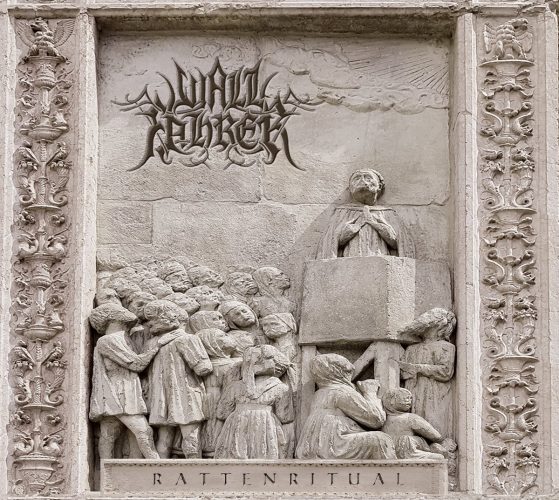
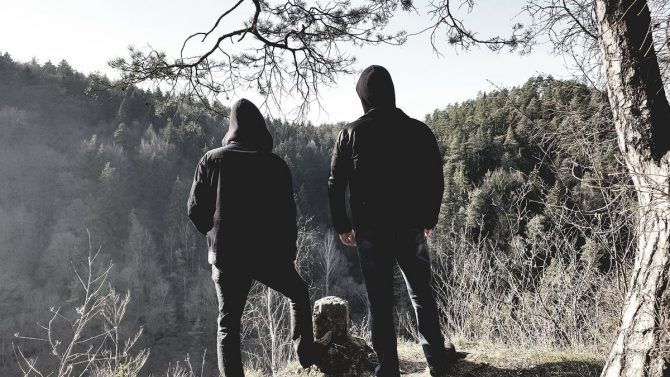
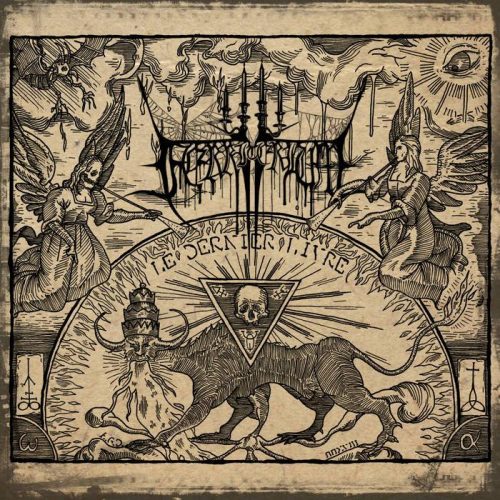
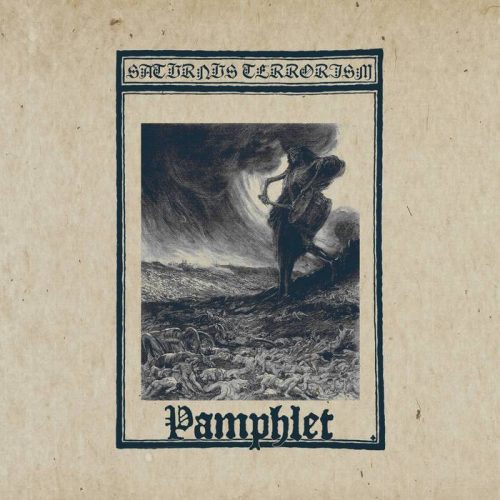
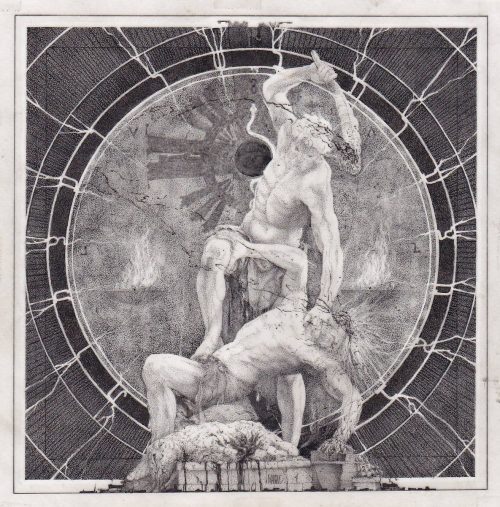
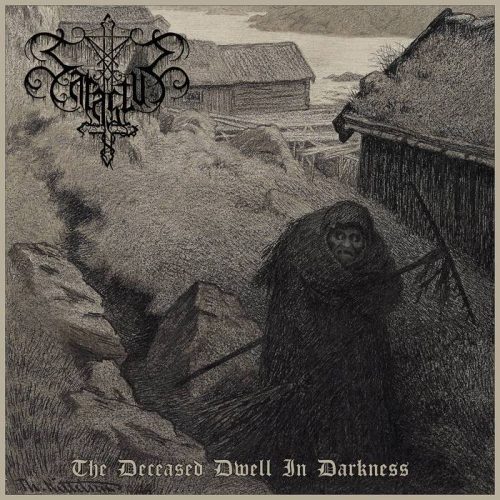
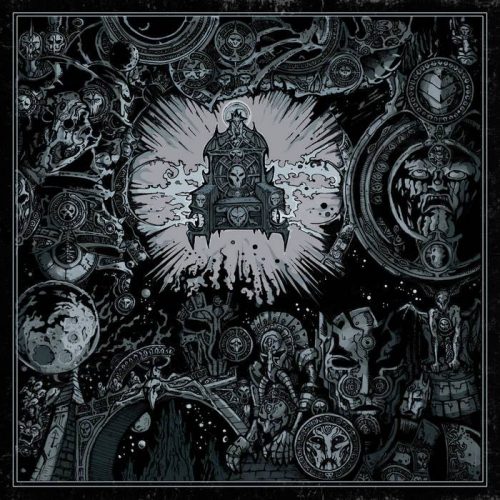

I just listened to Ferriterium, after watching Rauta’s YouTube review. I agree, it’s great, and has hints of Deletere. However, it reminded me most, in a good way, of Aorlhac. I now have to give these other suggestions a listen.